12:45 pm - 1:45pm
Moderator: Michael S. Turner
The career development session will consist of a panel of speakers --- all of whom have a Ph.D. in astronomy or physics --- whose jobs span a broad range of science-related occupations: professor at a research university, staff scientist at a national lab, professor at a liberal arts college, staff scientist at a planetarium/museum, and staff scientist at the Union for Concerned Scientists. The panelists will discuss a wide variety of issues ranging from their daily activities and their likes and dislikes about their jobs to their long term career prospects and goals. There should also be plenty of time for questions.
We sincerely hope this will be a valuable resource as you decide in which direction to take your career!
PANELISTS
August Evrard University of Michigan
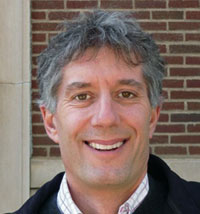 August Evrard is the Arthur F. Thurnau Professor of Physics and Astronomy at the University of Michigan. Dr. Evrard is a computational cosmologist whose research using simulations of large-scale structure formation is focused on understanding clusters of galaxies. Dr. Evrard received his Ph.D. from the State University of New York at Stony Brook, which he followed with postdoctoral positions at Princeton University, University of Cambridge, and the University of California, Berkeley.
August Evrard is the Arthur F. Thurnau Professor of Physics and Astronomy at the University of Michigan. Dr. Evrard is a computational cosmologist whose research using simulations of large-scale structure formation is focused on understanding clusters of galaxies. Dr. Evrard received his Ph.D. from the State University of New York at Stony Brook, which he followed with postdoctoral positions at Princeton University, University of Cambridge, and the University of California, Berkeley.
Brenna L Flaugher Fermilab Center for Particle Astrophysics
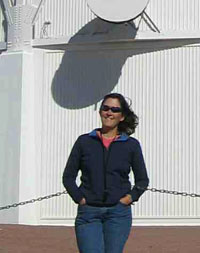 Brenna Flaugher holds a staff scientist position at Femi National Accelerator Laboratory, where she is the project manager for DECam, charged with building the camera for the Dark Energy Survey (DES). Dr. Flaugher began her career as a graduate student at Rutgers university in the field of experimental high energy physics, but is now a full time experimental cosmologists working on understanding the origin of our accelerating universe.
Brenna Flaugher holds a staff scientist position at Femi National Accelerator Laboratory, where she is the project manager for DECam, charged with building the camera for the Dark Energy Survey (DES). Dr. Flaugher began her career as a graduate student at Rutgers university in the field of experimental high energy physics, but is now a full time experimental cosmologists working on understanding the origin of our accelerating universe.
Laura Grego Union of Concerned Scientists
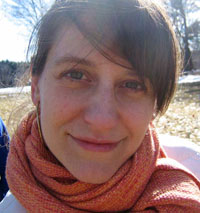 Dr. Laura Grego is a Senior Staff Scientist at the Union of Concerned Scientists (UCS), where she studies the implications of physics and technology for space security. She speaks frequently on security issues to scientists, policymakers, and the public in the United States and abroad. Dr. Grego received her Ph.D. from the California Institute of Technology, and was a postdoctoral researcher at the Harvard-Smithsonian Center for Astrophysics, where she studied galaxy clusters using Radio, IR, and X-ray data.
Dr. Laura Grego is a Senior Staff Scientist at the Union of Concerned Scientists (UCS), where she studies the implications of physics and technology for space security. She speaks frequently on security issues to scientists, policymakers, and the public in the United States and abroad. Dr. Grego received her Ph.D. from the California Institute of Technology, and was a postdoctoral researcher at the Harvard-Smithsonian Center for Astrophysics, where she studied galaxy clusters using Radio, IR, and X-ray data.
Thushara A. Perera Illinois Wesleyan University
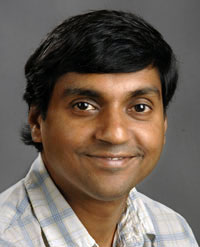 Dr. Thushara Perera is an Assistant Professor of Physics at Illinois Wesleyan University, a highly selective liberal arts university with an enrollment of just over 2,000 undergraduates. Dr. Thushara's research has focused on using semiconductor technology to create state-of-the-art detectors, whether for direct dark matter detection experiments, as he did as a graduate student at Case Western, or for IR cameras, as he did for his postdocs at the University of Chicago and at the University of Massachusetts Amherst. Today, Dr. Thushara continues his research in addition to teaching a broad variety of undergraduate physics courses.
Dr. Thushara Perera is an Assistant Professor of Physics at Illinois Wesleyan University, a highly selective liberal arts university with an enrollment of just over 2,000 undergraduates. Dr. Thushara's research has focused on using semiconductor technology to create state-of-the-art detectors, whether for direct dark matter detection experiments, as he did as a graduate student at Case Western, or for IR cameras, as he did for his postdocs at the University of Chicago and at the University of Massachusetts Amherst. Today, Dr. Thushara continues his research in addition to teaching a broad variety of undergraduate physics courses.
Grace Wolf-Chase Adler Planetarium / University of Chicago
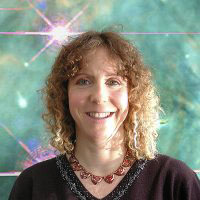 Dr. Grace Wolf-Chase has a joint appointment at Adler Planetarium and the University of Chicago. She spends about 40% of her time studying how stars form in different environments in our galaxy, about 20% of her time developing "Citizen Science" projects to incorporate public efforts into scientific research, and about 40% of her time in service to Adler, including education and public outreach efforts as well as participating in exhibit and show development. Prior to joining Adler/Chicago, Dr. Wolf-Chase received her Ph.D. from the University of Arizona, and worked as a postdoctoral researcher first as a National Research Council Fellow at Nasa/Ames Research Center in Moffet Field, and then as a University of California President's Fellow at UC Riverside.
Dr. Grace Wolf-Chase has a joint appointment at Adler Planetarium and the University of Chicago. She spends about 40% of her time studying how stars form in different environments in our galaxy, about 20% of her time developing "Citizen Science" projects to incorporate public efforts into scientific research, and about 40% of her time in service to Adler, including education and public outreach efforts as well as participating in exhibit and show development. Prior to joining Adler/Chicago, Dr. Wolf-Chase received her Ph.D. from the University of Arizona, and worked as a postdoctoral researcher first as a National Research Council Fellow at Nasa/Ames Research Center in Moffet Field, and then as a University of California President's Fellow at UC Riverside.
Michael S. Turner (Moderator) KICP, University of Chicago
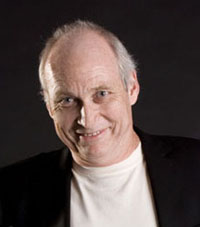 Dr. Turner is the Bruce V. & Diana M. Rauner Distinguished Service Professor in Astronomy and Astrophysics at the University of Chicago, the director of the Kavli Institute for Cosmological Physics, and is the former Assistant Director for Mathematical and Physical Sciences for the US National Science Foundation. Dr. Turner is a theoretical cosmologist whose research spans everything from nucleosynthesis to dark energy, and he is, with Rocky Kolb, the author of one of the standard textbooks in cosmology: The Early Universe. He has won numerous awards for his research, including most recently the Dannie Heinemann prize of the American Astronomical Society and the American Institute of Physics, which he shared with Rocky Kolb ''for their joint fundamental contributions to cosmology and their development of the field of particle astrophysics, which have resulted in a vibrant community effort to understand the early universe.''
Dr. Turner is the Bruce V. & Diana M. Rauner Distinguished Service Professor in Astronomy and Astrophysics at the University of Chicago, the director of the Kavli Institute for Cosmological Physics, and is the former Assistant Director for Mathematical and Physical Sciences for the US National Science Foundation. Dr. Turner is a theoretical cosmologist whose research spans everything from nucleosynthesis to dark energy, and he is, with Rocky Kolb, the author of one of the standard textbooks in cosmology: The Early Universe. He has won numerous awards for his research, including most recently the Dannie Heinemann prize of the American Astronomical Society and the American Institute of Physics, which he shared with Rocky Kolb ''for their joint fundamental contributions to cosmology and their development of the field of particle astrophysics, which have resulted in a vibrant community effort to understand the early universe.''

